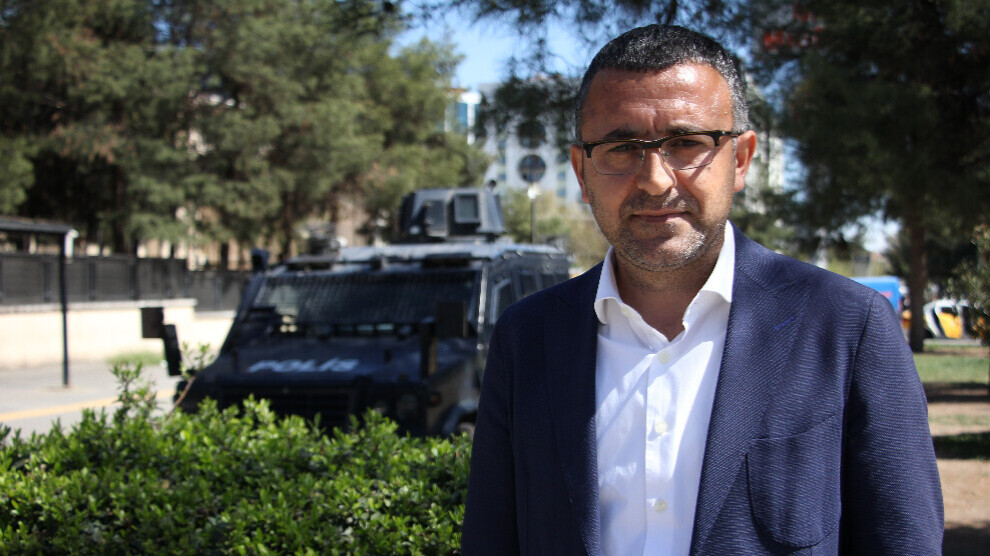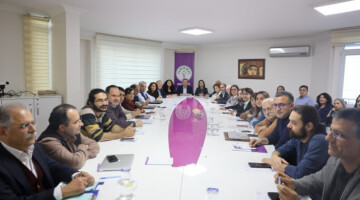The Constitutional Court (AYM) rejected the recusation request of the Peoples' Democratic Party (HDP) concerning the closure case against the party. In its defence, the HDP had previously requested to dismiss court member İrfan Fidan, but the recent decision has nothing to do with the lawyers’ objection.
Lawyer Serhat Eren, Co-Chair of HDP’s Law and Human Rights Commissions, told ANF that the recusation request concerned another Constitutional Court judge, Kenan Yaşar. The 30-day additional time granted to the HDP is related to the Turkish translation of the Kurdish audio recordings, which were post facto added to the case file and deemed as "evidence".
OBJECTION TO KENAN YAŞAR HAS BEEN REJECTED
“We made the first recusation request against a Constitutional Court judge, İrfan Fidan, who got involved in 49 separate investigations against HDP and HDP members when he was the prosecutor, deputy chief prosecutor and chief prosecutor respectively,” Eren revealed to ANF. “But the Constitutional Court had rejected it. The most recent rejection announced by the Constitutional Court concerns the objection we made against Kenan Yaşar, another member of the Constitutional Court.”
ADDITIONAL EVIDENCE CANNOT BE CITED AS NEW EVIDENCE AFTER PROCESS IS FINISHED
Lawyer Eren explained the reason for their recusation request: “First, the Chief Public Prosecutor of the Court of Cassation had prepared the indictment against the HDP, submitted it to the Constitutional Court, and the Constitutional Court rejected the indictment. Afterwards, the Chief Public Prosecutor of the Court of Cassation had prepared a new indictment and submitted it to the Constitutional Court. We had made our initial and written defence regarding the closure case. The Chief Public Prosecutor of the Court of Cassation had also submitted its written opinion.
After all these judicial processes, Adıyaman and Ankara prosecutors sent some documents, information and audio recordings related to the file of Behçet Yıldırım and Semra Güzel to the Chief Public Prosecutor of the Court of Cassation. The Chief Public Prosecutor of the Court of Cassation added these documents to HDP’s closure case and submitted them to the Constitutional Court as evidence. Moreover, he cited them as new evidence. This is exactly what we objected to. We argued that these documents could not be evidence. Because Güzel’s pictures were taken during the peace process when Güzel was not yet an HDP member or deputy. We also said that the audio recordings were made in the 1990s. We argue that they cannot be annexed to the file as 'evidence' because the written defence was already completed.”
'EVIDENCE' ALREADY THERE
Eren explained why the evidence could not be added later: “When this indictment was being prepared, the 'evidence' in question was already there. The investigation against Semra Güzel has already been launched in 2017. This evidence was also present when the indictment for the HDP closure case was prepared, but they were not cited by the indictment at that time. The indictment was accepted as such by the Constitutional Court. The evidence process was over, we made our defence and the prosecutor's office presented its opinion. Then this evidence was again sent to the Constitutional Court as if it was 'new evidence'. However, no trial can be carried out without a lawsuit.
A court cannot decide over actions that are not cited in an indictment. The investigation against Semra Güzel does not cite the actions specified in the indictment. Therefore, if the Chief Public Prosecutor of the Court of Cassation wants to evaluate them, he should introduce a new indictment. This new indictment should be submitted to the Constitutional Court. If he does not prepare a new indictment, he cannot consider it as new evidence. In order to write an additional indictment, new evidence must emerge after the submittal of the indictment. Hence, additional documents presented under these conditions do not constitute new evidence or a new indictment.”
JUDGE LOST HIS IMPARTIALITY
Lawyer Eren also said that the Constitutional Court, while presenting these additional documents to the HDP, did not use legal terminology in the first place. Later, when they asked for an explanation, Kenan Yaşar, a member of the Constitutional Court, sent a response that looked like a verdict. “The Constitutional Court submitted this investigation file, that is, additional documents and information to us. But the Constitutional Court did not use any legal remarks, saying that these was additional evidence. These audio recordings and the investigation file submitted to us should bear a legal name. Is this evidence? Is this additional evidence? The Constitutional Court was supposed to provide a legal definition. Quite naturally, we asked the name of it within the legal terminology.
Kenan Yaşar said in his response: “These documents can be seen as evidence”. Yaşar used the term "evidence" to indicate that the crime had occurred. We argue that if the member of the Constitutional Court defines additional documents that cannot be considered as legal evidence as "new evidence", he expresses his opinion on the merits of the case.
This means that the judge has lost his impartiality. Because it is not lawful for a member of the Constitutional Court to consider them as 'evidence' before the Constitutional Court has decided whether they are evidence or not. Therefore, we demanded that this judge should be recused. The Constitutional Court has rejected our request.”
WE WILL REVIEW TURKISH TRANSLATIONS
Lawyer Eren also revealed that the additional time was given to the HDP to review the Turkish translation of the audio recordings in question. “The Constitutional Court sent the submitted Kurdish audio recordings back to the Chief Public Prosecutor of the Court of Cassation for a translation into Turkish. Probably these translations are already finished, and the Constitutional Court will request us to 'make our objections to the translation, if any, within a month, in terms of its procedural and legal aspects.'
There is no official notification sent to us. Therefore, we are making our comments as long as we follow the developments of the press. After the official notification is submitted to us, we will also find out about what the court said in its interim decision.”













